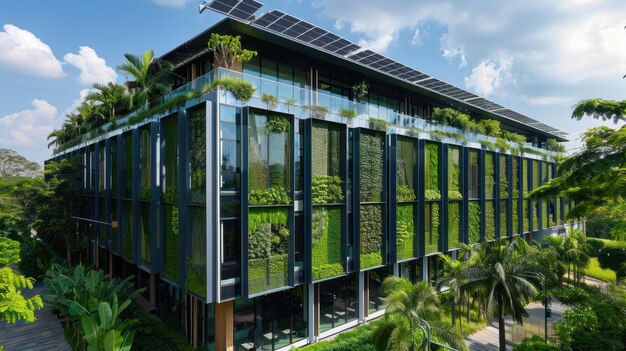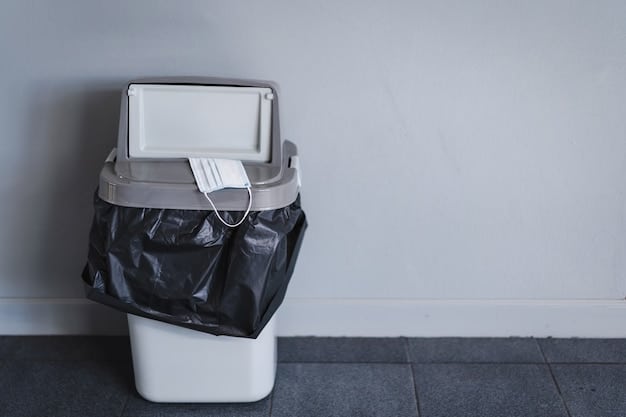Spot Greenwashing: Eco-Friendly US Hotels in 2025

Uncover greenwashing tactics used by US hotels in 2025 to identify truly eco-friendly accommodations, ensuring your travel choices support genuine sustainability and environmental responsibility.
Are you looking for truly eco-friendly hotels in the US? It’s becoming increasingly difficult to discern genuine efforts from “greenwashing.” This article, Is Your US Hotel Truly Eco-Friendly? 7 Greenwashing Tactics to Watch Out For in 2025, will equip you with the knowledge to make informed and sustainable choices.
The Rise of Greenwashing in the Hospitality Industry
The demand for sustainable travel is soaring, leading many hotels to market themselves as eco-friendly. Unfortunately, not all claims are created equal. Some hotels engage in “greenwashing,” a deceptive practice of exaggerating or falsely promoting their environmental efforts. Understanding this trend is essential for responsible travelers looking for genuinely eco-conscious options.
What is Greenwashing?
Greenwashing is when a company spends more time and money claiming to be “green” through advertising and marketing than actually implementing business practices that minimize environmental impact. It’s a form of deception that can mislead consumers into believing they are supporting sustainable businesses when they are not.
Why is Greenwashing a Problem?
Greenwashing undermines genuine sustainability efforts. It creates distrust among consumers, making it difficult to identify truly eco-friendly hotels. This can discourage travelers from making sustainable choices, hindering the progress towards a more environmentally responsible hospitality industry.

- Misleading certifications: Hotels might display fake or irrelevant certifications to appear eco-friendly.
- Vague language: Using terms like “eco-friendly” or “green” without providing specific details.
- Hidden trade-offs: Highlighting a single eco-friendly feature while ignoring other harmful practices.
To combat greenwashing, travelers need to be vigilant and informed. By understanding the common tactics used by hotels, you can make more sustainable choices and support businesses that are truly committed to environmental responsibility.
Tactic 1: The “Towel Reuse” Program Illusion
One of the most common and easily recognizable greenwashing tactics is the “towel reuse” program. While seemingly beneficial, these programs often serve as a superficial attempt to appear eco-conscious without addressing more significant environmental impacts. It is a small step, but sometimes it’s just for show.
How It Works
Hotels encourage guests to reuse their towels and linens to “save water and energy.” Guests are prompted to hang up their towels if they wish to reuse them, rather than having them replaced daily. This initiative is often presented as a major environmental commitment.
The Problem with Towel Reuse Programs
While reducing laundry frequency can save water and energy, the actual impact is often minimal compared to the hotel’s overall environmental footprint. Many hotels implementing these programs fail to address other significant issues, such as energy consumption, waste management, and sourcing practices.
Furthermore, some hotels use these programs as a cost-saving measure, reducing laundry expenses without reinvesting the savings into other sustainability initiatives. This makes the program more about profit than genuine environmental concern.
A more comprehensive approach would include investing in energy-efficient appliances, implementing robust recycling programs, and sourcing sustainable products. Look beyond the towel reuse program to gauge a hotel’s true commitment to sustainability.
Tactic 2: Vague and Unsubstantiated Claims
Another prevalent greenwashing tactic involves using vague and unsubstantiated claims about environmental efforts. Hotels may use terms like “eco-friendly,” “green,” or “sustainable” without providing specific details or evidence to support these claims. The lack of transparency can mislead consumers and obscure the true environmental impact of the hotel.
The Power of Suggestion
Hotels often rely on the power of suggestion to create a perception of sustainability. They might use imagery of lush greenery, natural landscapes, or smiling faces to evoke a sense of environmental responsibility. However, these visual cues can be misleading if not backed by concrete actions.
Questioning the Claims
When hotels make vague claims, it’s essential to ask for specifics. What exactly makes the hotel “eco-friendly”? What specific measures have they taken to reduce their environmental impact? If the hotel cannot provide clear and verifiable information, it’s likely a case of greenwashing.

- Energy efficiency: Look for hotels that use energy-efficient lighting, appliances, and HVAC systems.
- Water conservation: Inquire about water-saving measures, such as low-flow fixtures and water reuse programs.
- Waste reduction: Ask about recycling programs, composting initiatives, and efforts to reduce single-use plastics.
Genuine eco-friendly hotels will be transparent about their sustainability practices and willing to provide detailed information to support their claims. Don’t be afraid to ask questions and demand accountability.
Tactic 3: Highlighting a Single “Green” Feature
Some hotels focus on highlighting a single eco-friendly feature while ignoring other significant environmental concerns. This tactic, known as “single attribute greenwashing,” creates a false impression of overall sustainability. It distracts from the hotel’s broader environmental impact. This selective highlighting can be misleading for travelers seeking genuinely eco-conscious options.
Focusing on the Trivial
Hotels might emphasize a minor green initiative, such as using recycled paper for brochures, while overlooking more significant issues like energy consumption, water usage, and waste generation. This creates a distorted view of the hotel’s environmental performance.
The Importance of a Holistic Approach
True sustainability requires a holistic approach that addresses all aspects of a hotel’s operations. This includes energy and water conservation, waste reduction, sourcing of sustainable products, and engagement with the local community.
Are they actively working to reduce their carbon footprint? Do they support local environmental initiatives? A truly sustainable hotel will demonstrate a comprehensive commitment to environmental responsibility across all areas of its operations.
In conclusion, focusing on a single “green” feature is a common greenwashing tactic that can mislead consumers. By looking beyond the superficial and assessing a hotel’s overall environmental performance, travelers can make more informed and sustainable choices.
Tactic 4: Misleading Certifications and Labels
Certifications and labels can be valuable tools for identifying eco-friendly hotels. However, some hotels use misleading or irrelevant certifications to deceive consumers. It’s essential to understand the different types of certifications and their credibility. Not all certifications are created equal, and some are easier to obtain than others.
The Variety of Certifications
There are numerous environmental certifications and labels available, ranging from well-established and rigorous programs to less credible and self-proclaimed endorsements. Some certifications focus on specific aspects of sustainability, while others take a more comprehensive approach.
How to Spot Fake Certifications
One of the easiest ways to identify fake certifications is to verify their authenticity. Look for certifications from reputable organizations with clear standards and verification processes. Check the certification’s website to confirm that the hotel is listed as certified.
Look for certifications that are widely recognized and respected within the industry. Examples include LEED (Leadership in Energy and Environmental Design), Green Key, and Green Globe. These certifications have stringent standards and independent verification processes.
In summary, misleading certifications and labels are a common greenwashing tactic. By understanding the different types of certifications and their credibility, travelers can avoid being deceived and support hotels with genuine environmental commitments.
Tactic 5: Ignoring Supply Chain Sustainability
A hotel’s sustainability efforts extend beyond its immediate operations to include its supply chain. Ignoring supply chain sustainability is a common greenwashing tactic. Hotels may promote their eco-friendly practices while failing to address the environmental and social impacts of their suppliers.
The Importance of Sustainable Sourcing
Sustainable sourcing involves selecting suppliers who adhere to environmentally and socially responsible practices. This includes reducing carbon emissions, conserving water, minimizing waste, and ensuring fair labor practices. A hotel’s supply chain can have a significant impact on its overall sustainability.
What to Look For
Consumers should consider inquiring whether hotels prioritize suppliers with environmental certifications. Do they source local and organic products? Are they committed to ethical labor practices? These are all important questions to ask when evaluating a hotel’s commitment to supply chain sustainability.
- Ethical sourcing: Supporting suppliers with fair labor practices and safe working conditions.
- Local sourcing: Reducing transportation emissions and supporting local economies.
- Sustainable materials: Choosing products made from recycled or renewable materials.
In conclusion, ignoring supply chain sustainability is a common greenwashing tactic. By considering a hotel’s sourcing practices, travelers can make more informed choices and support businesses that are committed to comprehensive sustainability.
Tactic 6: Lack of Transparency and Accountability
Transparency and accountability are essential for genuine sustainability. A lack of transparency and accountability is a significant greenwashing tactic. Hotels may avoid providing detailed information about their environmental performance or refuse to be held accountable for their claims.
The Power of Information
Truly sustainable hotels will be transparent about their environmental impact. They will provide data on their energy and water consumption, waste generation, and carbon emissions. This information allows consumers to assess the hotel’s performance and hold them accountable.
How to Hold Hotels Accountable
If a hotel’s claims seem too good to be true, don’t hesitate to ask questions. Request data on their environmental performance and inquire about their sustainability initiatives. If the hotel is unwilling to provide this information, it’s likely a case of greenwashing.
Look for hotels that publish annual sustainability reports and have their environmental performance verified by independent third-party organizations. This demonstrates a commitment to transparency and accountability.
Tactic 7: Promoting Carbon Offsets Without Emission Reduction
Carbon offsetting has become a popular sustainability strategy, allowing businesses to compensate for their carbon emissions by investing in projects that reduce emissions elsewhere. However, some hotels use carbon offsets as a way to greenwash their operations without making substantive changes to reduce their emissions directly. This can be a deceptive practice that undermines the credibility of carbon offsetting.
What are Carbon Offsets?
Carbon offsets typically involve investing in projects that reduce or remove carbon dioxide from the atmosphere, such as renewable energy projects, reforestation initiatives, or energy efficiency improvements. The idea is that these projects can “offset” the emissions produced by other activities, like hotel operations.
The Downside of Carbon Offsets
If hotels solely rely on carbon offsets without implementing internal measures to significantly reduce their own emissions, it can be seen as a greenwashing tactic. Offsets should complement, not replace, direct actions to reduce carbon emissions. In that sense, carbon offsetting should be part of a broader sustainability strategy, including energy efficiency, renewable energy adoption, and waste reduction efforts.
| Key Aspect | Brief Description |
|---|---|
| ♻️ Towel Reuse | Often superficial; real impact depends on other eco-efforts. |
| 🌱 Vague Claims | Terms like “eco-friendly” require specific, verifiable details. |
| ✔️ Single Feature | Focusing on one green aspect while ignoring others is misleading. |
| 🏷️ Misleading Labels | Verify certifications; some are less credible than perceived |
FAQ
▼
Greenwashing is when hotels exaggerate or falsely promote their environmental efforts to attract eco-conscious travelers, often without making substantial changes to their practices.
▼
Look for vague claims, irrelevant certifications, focus on a single “green” feature, lack of transparency, and reliance on carbon offsets without actual emission reductions.
▼
Look for certifications like LEED, Green Key, and Green Globe, which have stringent standards and independent verification processes, indicating a genuine commitment to sustainability.
▼
A hotel’s environmental impact extends to its suppliers. Sustainable sourcing ensures that products and services are obtained ethically and with minimal environmental harm.
▼
Inquire about their energy and water consumption, waste reduction programs, use of renewable energy, and partnerships with local environmental organizations to gauge their dedication.
Conclusion
In summary, identifying **greenwashing** in US hotels requires diligence and awareness. By recognizing these tactics and asking the right questions, travelers can make informed choices and support hotels committed to genuine sustainability and environmental responsibility in 2025 and beyond.





